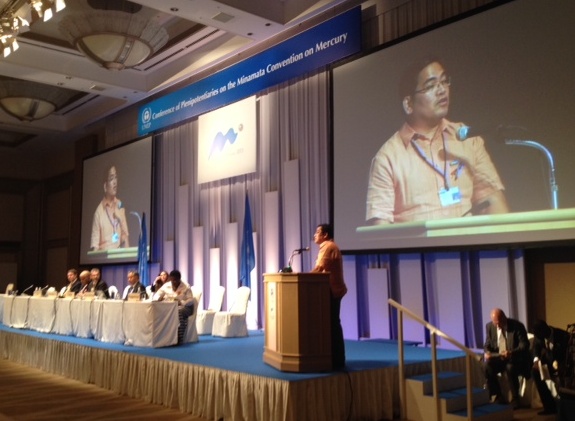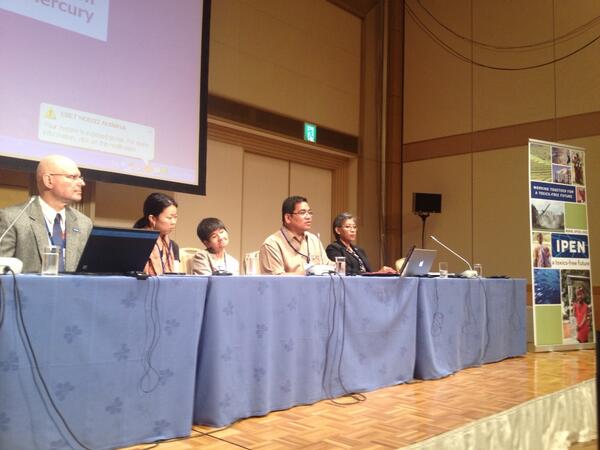IPEN representatives participated in the open-ended intergovernmental preparatory meeting and the Conference of Plenipotentiaries (the Diplomatic Conference, or "DipCon") on the “Minamata Convention on Mercury” in the second week of October, 2013 in Japan. Please see information about IPEN's activities during the conference below and via the tabs above.
IPEN's closing statement, given to plenary on 11 October, 2013, by IPEN Co-Chair Manny Calonzo.
The mercury treaty is a victory because it represents a global consensus that mercury pollution presents a serious threat to human health and the environment. Now we need to get to work.
A Call for Action in Minamata
by Joseph DiGangi, IPEN, for Environmental Health News
Determination takes on a special meaning here. Despite twisted limbs, tremors and confinement to wheelchairs, people afflicted by the world’s most infamous mercury poisoning still struggle for justice. As a new international mercury treaty is launched, they hope that no one ever again will suffer as they have. More....
For Immediate Release: October 10, 2013
The New Mercury Treaty: 3 Things That Need to Happen Now
(Kumamoto, Japan) The signing of the world’s first international mercury treaty by delegates from more than 100 countries should spur three key actions to reduce total mercury pollution, the International NGO IPEN said.“The mercury treaty is a victory because it represents a global consensus that mercury pollution presents a serious threat to human health and the environment. Now we need to get to work,” said Joe DiGangi, IPEN’s Senior Science and Technical Adviser. “Some treaty provisions are legally-binding obligations and others require governments to “endeavor” to take action. This means that each government has a moral, if not a legal commitment to fully implement all treaty provisions.”
IPEN recommends three key actions as work on the treaty gets underway.
Read the entire release.
For Immediate Release: October 10, 2013
To Tackle ASGM, Mercury Treaty Should Apply Lessons from the Minamata Tragedy
(Kumamoto, Japan) The world’s first international mercury treaty should address mercury in artisanal small-scale gold mining (ASGM) by applying the lessons from the Minamata tragedy, the International NGOIPEN said today.
“Future Minamata’s are in the making, as we speak, in almost 80 developing countries, each with hundreds of small-scale gold mining sites. These sites are the largest source of mercury air emissions and intentional
mercury use in the world, and we are already seeing harm from mercury pollution in women, young children, families and communities,” said Yuyun Ismawati, Senior Advisor of BaliFokus, Indonesia and IPEN lead for ASGM/Mining issues.
Read the entire release.
For Immediate Release: October 8, 2013
Mercury Treaty Should Resolve Issues in Minamata City and at Future “Minamata” Sites around the World
(Kumamoto, Japan) The world’s first international mercury treaty should spur governments to make the name “Minamata” synonymous with the successful resolution of a serious health and environmental crisis, the international NGO IPEN said today. Issues raised by Minamata victims for nearly thirty years should be finally addressed, and all governments must act quickly to avoid future “Minamata” tragedies now developing in other parts of the world.
“The Mercury Treaty is particularly connected to Minamata because it specifically calls on governments around the world to learn and apply the lessons from the Minamata tragedy to prevent mercury poisoning in the future. But governments cannot be asked to implement the lessons from Minamata if those same lessons remain unresolved in Minamata,” said Joe DiGangi, IPEN’s senior science and technical adviser.
Read the entire release
Minamata Victims and Citizens issue a Petition to all governments concerning the Minamata Convention on Mercury
For Immediate Release: October 6, 2013:
Make Minamata An International Model for Resolution of Environmental Crises
For More Information: Takeshi YASUMA, Citizens Against Chemicals Pollution (CACP), Japan
Email: ac7t-ysm@asahi-net.or.jp / Phone: +81-45-364-3123
(Minamata, Japan) The world’s first international mercury treaty offers Japan an opportunity to make Minamata an international model for how to resolve environmental crises, the International NGO IPEN said today. Speaking in Minamata on the eve of a diplomatic conference in Kumamoto that will adopt the “Minamata Convention,” senior science and technical advisor for IPEN, Joe DiGangi, said:
“The Mercury Treaty is particularly connected to Minamata because it specifically calls on governments around the world to learn and apply the lessons from the Minamata tragedy to prevent mercury poisoning in the future. Unfortunately, the original tragedy is still not resolved.”
“With the Minamata name comes a special responsibility – and an opportunity to take actions so that the name Minamata is not only associated with a tragedy, but becomes a positive model in the resolution of the world’s worst case of mass mercury poisoning,” DiGangi continued.
Read the entire release


